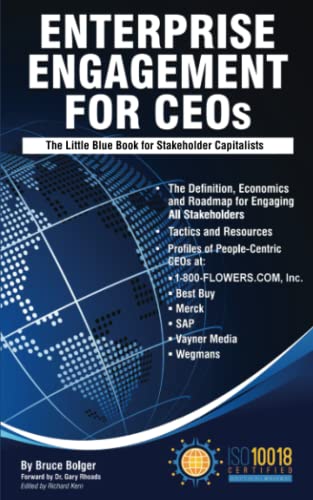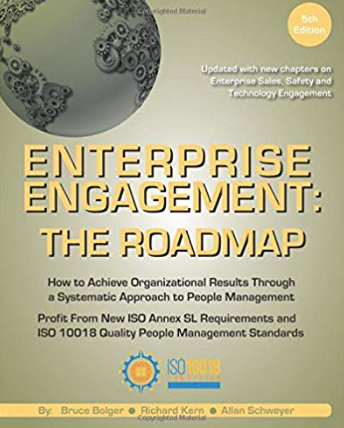Professor to Organizations: Engagement Does Not Equal Financial Success
 Writing in Psychology Today, this professor and management consultant argues that efforts to elevate employee engagement or experiences are unlikely to derive financial results unless specifically designed to do so.
Writing in Psychology Today, this professor and management consultant argues that efforts to elevate employee engagement or experiences are unlikely to derive financial results unless specifically designed to do so.Most Engagement Programs Don’t Work
Equip People for What Counts
Click here for links to RRN Preferred Solution Providers.
“Employee engagement alone doesn't guarantee an organization's financial success. Engagement initiatives rarely work and often fail to provide tangible returns on investment, and few studies find a positive link between engagement and real-world objective financial performance metrics.”
These are the key conclusions of Llewellyn E. van Zyl Ph.D., Professor of Positive Psychology at the Optentia Research Program of North-West University, South Africa, in his recent Psychology Today article, The Employee Engagement-Performance Myth. Editors note: Many of the key conclusions of this article are addressed in the Master Measurement Model for Employee Performance, produced by the American Quality and Productivity Center in the early 2000s for the Incentive Research Foundation.
His skepticism does not come without a solution. “Companies chasing engagement metrics without understanding their financial impact risk misallocating resources toward activities failing to achieve desired business outcomes. Instead, organizations must embrace a balanced, data-driven approach aligning employee efforts with strategic objectives and prioritizing initiatives proven to significantly contribute to financial success.”
Most Engagement Programs Don’t Work
He writes, “Companies are always looking for ways to boost employee performance and financial success. One widely used strategy centers around improving employee engagement. The belief is that nurturing engaged, happy employees will lead to increased productivity, better customer service, and ultimately higher profits. However, the harsh reality is that employee engagement alone doesn't necessarily translate into better financial performance.”
He continues, “Organizations invest millions in engagement initiatives like rewards programs, team-building activities, and wellness plans, yet these rarely work. While these efforts may boost morale and create a positive environment, they often fail to deliver a real return on investment. The truth is, if these initiatives don't directly impact core business metrics, they don't really matter from a financial standpoint.”
Equip People for What Counts
The key to driving financial performance, he argues, “not in fostering engagement, but rather in ensuring job characteristics and employees' efforts are aligned with the company’s strategic objectives and organizational growth goals. The challenge, however, is to ensure that the right growth-oriented metrics are identified and that these metrics are, indeed, predictive of an organization’s growth goals and financial growth targets. So rather than relying solely on engagement metrics, companies should adopt a more comprehensive and data-driven approach to their organizational development, talent and performance management strategies.”
More specifically: “Financial performance should be viewed as a process and an outcome of various ‘triggers’ (e.g., job characteristics), process factors (e.g., motivation, or customer satisfaction), and contextual factors (e.g., organizational policies and procedures). To identify the right factors, companies should dissect their organizational strategy, growth goals and values, job design models, employee capability profiles, and job characteristics in order to identify important predictors of financial performance. These should then be actively measured and modeled to determine the most appropriate ‘route’ to take or ‘factors’ that need to be addressed to ensure financial performance.”
For instance, at an auto dealership, “sales performance depends on capabilities (e.g., negotiation skills), job characteristics (e.g., manager support), environmental factors (e.g., inventory availability), and rewards (e.g., commission structure). We know that these factors lead to improved organizational commitment and extra-role behaviors. These factors in turn predict sales numbers and financial performance."
He advises that “measuring these factors and figuring out the strongest or most relevant predictors at any given time can help target the allocation of resources or interventions to address the issues that would get us the most proverbial bang for our buck. In other words, not all factors are equally important at any given moment, and we need to identify the right and most important factors to address to help us get to our outcome.”
His bottom line? “Engagement alone doesn't guarantee employees make decisions contributing to the bottom line. Engaged employees lacking a clear understanding of how their contributions impact the organization's financial success may inadvertently invest their energy into activities that yield little tangible returns. By leveraging advanced data analytics and adopting a more data-driven decision-making approach, organizations can gain valuable insights into the specific drivers of financial performance within their unique business context. This approach allows companies to identify the most impactful areas for investment and prioritize initiatives that directly contribute to achieving their financial goals.”
How RRN and Brand Media Coalition: Your Partner in Success in Incentives, Rewards, and Recognition

Published by the Enterprise Engagement Alliance at TheEEA.org
- The only weekly news, how-to and resource publication of record for the Incentive, Rewards, and Recognition field.
- The only marketing agency focusing specifically on the IRR and broader engagement marketplace.
- All the industry news, research, announcements, and how-to articles read by over 20,000 end-users in sales, marketing, and human resources; incentive, recognition, loyalty and promotional companies, as well as marketing and human resources agencies, seeking to enhance performance through effectively designed incentive programs.
- Unparalleled business development services for engagement, incentive and incentive travel, recognition firms; brands, gift cards and master fulfillment companies, and technology firms, featuring ROI-based business development strategy design and ongoing digital and social media and e-newsletter communications to help marketers profit in the coming era of cookie-less marketing.
- Unique abilities for solution providers to sponsor authoritative, evergreen content directly related to what they sell through the EEA’s Effective Practices series on articles in our media platforms.
- EEA YouTube Channel with over three dozen how-to and insight videos and growing with nearly 100 expert guests.
- Access to new technologies from EEA preferred solution providers enabling brands to create their own points-based or transactional redemption site.
- Unparalleled expertise in program design, return on investment measurement, reporting, and prescriptive analytics.

















